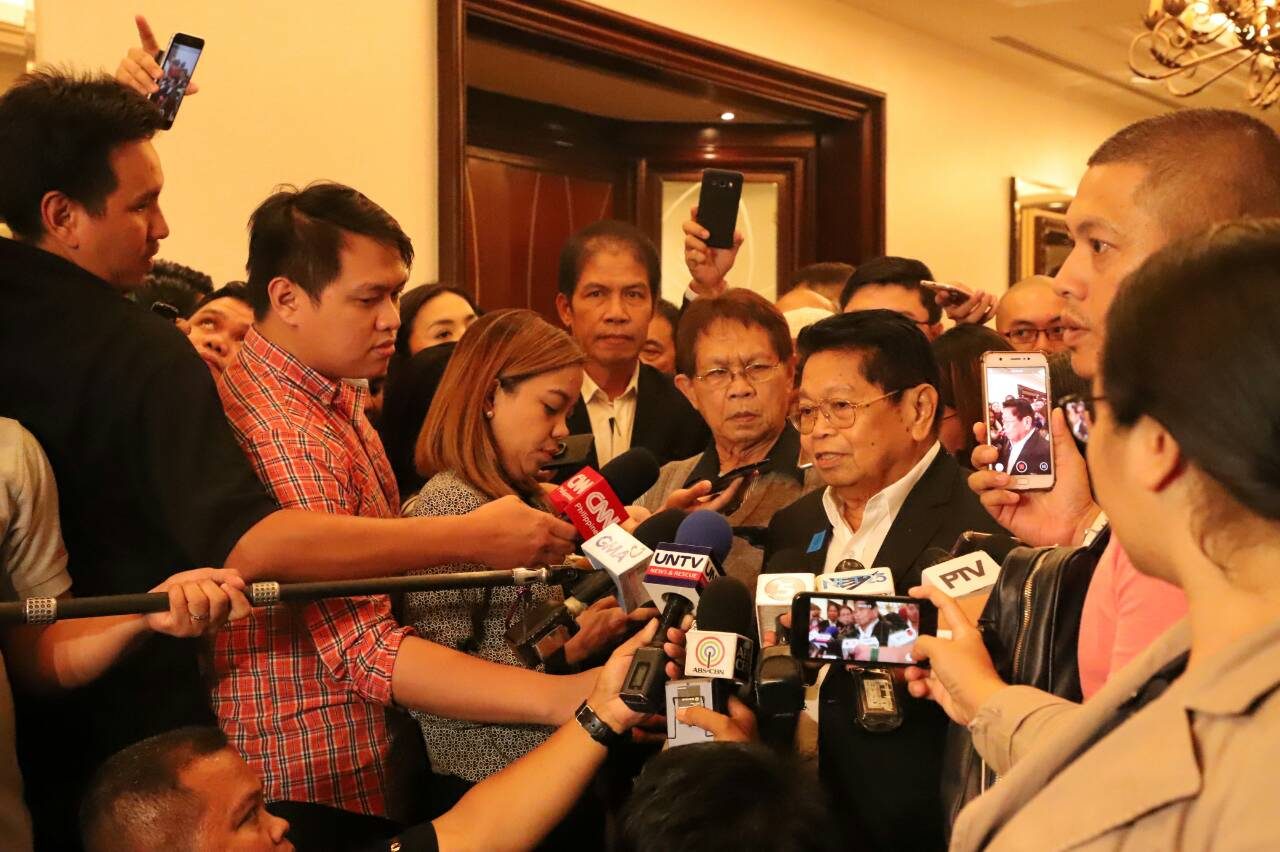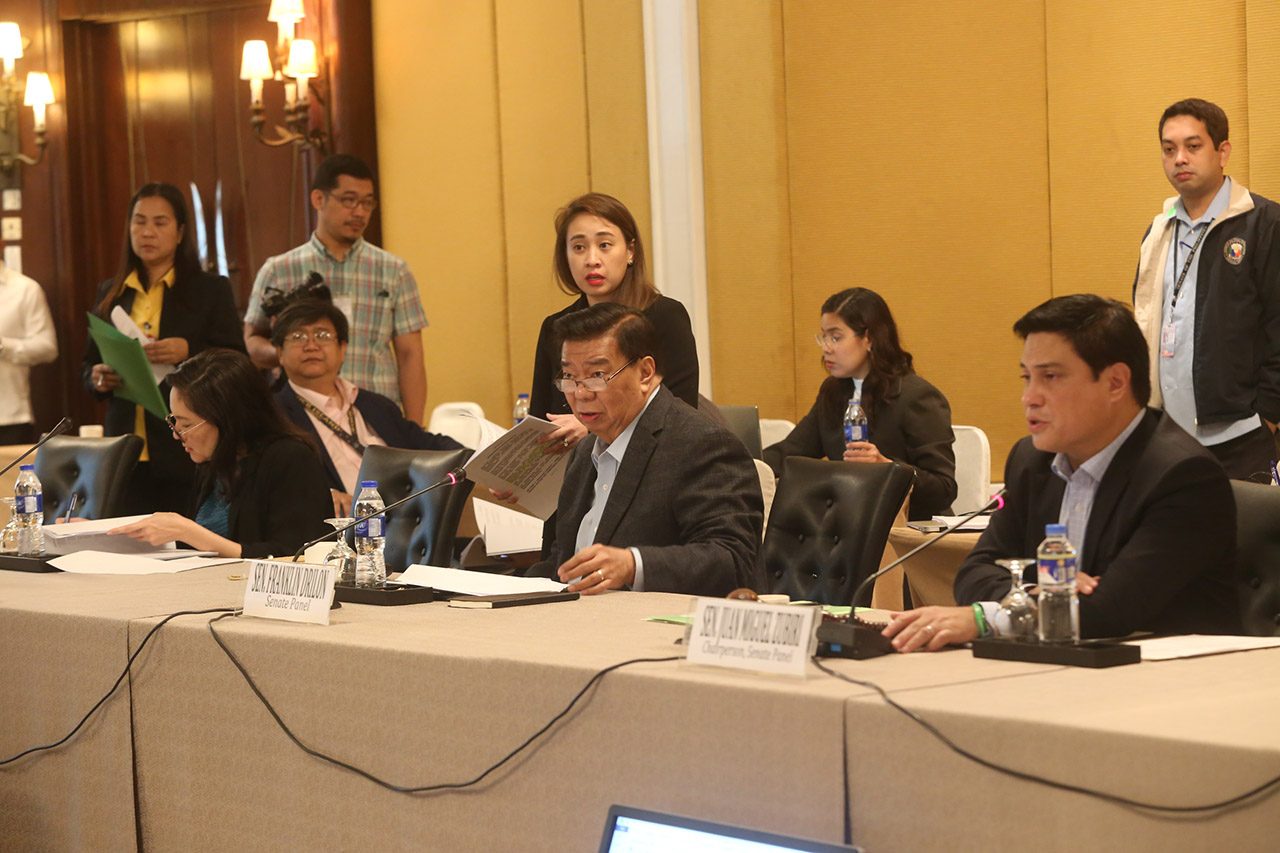SUMMARY
This is AI generated summarization, which may have errors. For context, always refer to the full article.

MANILA, Philippines (UPDATED) – Three issues consumed the bicameral conference committee on the proposed Bangsamoro Basic Law (BBL) on its targeted last day of deliberations Tuesday, July 17.
Senate Majority Leader Juan Miguel Zubiri, the bicam chair, was initially confident of the speedy approval of the bill. The mood, however, changed in the afternoon, as the Bangsamoro Transition Commission (BTC) raised 3 issues: the process or plebiscite, preamble, and the bill’s seeming dependence on Philippine or national laws.
The BTC raised these issues to Zubiri, who later called for a special session between lawmakers and BTC members at the EDSA Shangri-La in Mandaluyong City.
The BTC opposed the repeated mentions of “in accordance with national laws” in the bill’s provisions, especially on the powers of the Bangsamoro government.
BTC chairman Ghazali Jaafar threatened that they would withdraw support for the BBL if the measure would restrict the Bangsamoro parliament’s authority to enact laws.
“They keep on saying that our parliament should legislate laws always in accordance or in adherence to the national law. We don’t agree with that…. If they keep on changing [draft BBL], we might change our opinion,” Jaafar told reporters in an interview.

Rappler learned that during the discussion some lawmakers, including House Majority Leader Rodolfo Fariñas, told the BTC that they could not expect Congress to pass the BTC version in toto. They reportedly said that Congress is not bound by the BTC’s agreement with the executive.
In the end, the bicam decided to remove the mention of “national laws,” as long as the 1987 Constitution would be mentioned.
After all, they said, Article 10, Section 20, of the 1987 Constitution mandates that the organic act of autonomous regions, such as the Bangsamoro, should be subject to national laws.
“It’s just a reiteration. But of course they have to sell this document to the people of Bangsamoro. They are ticklish on the issue that national laws is being continuously mentioned in each and every paragraph. We agreed to just have one general provision that say it is under, within the context of the 1987 Constitution and national laws and this organic act. Di na paulit ulit (We won’t repeat it),” Zubiri told reporters after the caucus.
Article 5, Section 2, of the proposed BBL now states that the Bangsamoro government’s powers are subject to the Constitution and the Organic Law, not to national laws.
Minority Leader Franklin Drilon agreed to the deletion, saying “in so far as national laws, as long as it is not inconsistent with the Organic Law, they should be applicable to the Bangsamoro.”
Jaafar, for his part, gave assurance that the laws that the Bangsamoro parliament would pass would be constitutional.
“Ang proposal namin ay ’pag gagawa ang Bangsamoro Parliament ng batas, dapat ay hindi ’to babangga sa Saligang Batas. Duon ay sang-ayon kami 100 percent,” Jaafar told reporters after the meeting. (Our proposal is, whenever the Bangsamoro Parliament creates a law, it should never be in conflict with the Constitution. We agree to this 100 percent.)
Preamble, plebiscite

Another issue discussed in the caucus was the preamble of the proposed organic act. While Jaafar refused to describe it in detail, two bicam members told Rappler that the BTC wants to retain the aspirations of the “Bangsamoro people and other inhabitants.”
One bicam member said it “did not make sense” to some lawmakers because not all inhabitants of the region are “Bangsamoro people.”
Fariñas confirmed the issue and said he instead proposed that they use the phrase “We, the Filipino people, cognizant of the aspirations of the Bangsamoro people.”
He added that unlike the Constitution written and approved by the Filipino people, the proposed organic law of the Bangsamoro could not be written by its people, citing Article 10 of the 1987 Constitution which mandates Congress to do so.
As such, the BBL preamble could not be stated in the same way as the Constitution and the way the BTC wants to. The panel has yet to settle the issue and has assigned a subcommittee to address it.
“I was the one who introduced that. The way it was phrased is not sensible because the way it is worded is ‘We, the Bangsamoro people.’ Then how will you end it – do ordain and promulgare this basic or organic law? It’s not them doing it. It’s the Congress of the Philippines. What I propsed is ‘We, the Filipino people, cognizant of the aspirations of the Bangsamoro people.’ Kumpleto,” Fariñas told reporters in a mix of English and Filipino.
“How can the Bangsamoro people be writing an organic law? They cannot. It’s Congress of the Philippines [according to the Constitution] and Congress of the Philippines is the creation of the Filipino people… We get our mandate from them,” he added.
The BTC also raised again the issue of the plebiscite of 6 municipalities of Lanao del Norte and 39 barangays of Cotabato during the closed-door meeting.
They earlier proposed that these areas vote in a plebiscite without seeking the approval of their mother units. In the past, they voted for their inclusion in the Autonomous Region in Muslim Mindanao but lost because their mother units voted against it.
The issue, however, was not deeply discussed during the caucus as they focused on the preamble and removal of “national laws” in the provisions.
Earlier, the bicam sought the help of President Rodrigo Duterte in breaking the impasse on the issue of the plebiscite. In the end, Duterte did not side with the Bangsamoro Transition Commission and told the panel to adopt the House provision that would require mother units to have a say on the inclusion of their areas in the region. – Rappler.com
Add a comment
How does this make you feel?
There are no comments yet. Add your comment to start the conversation.